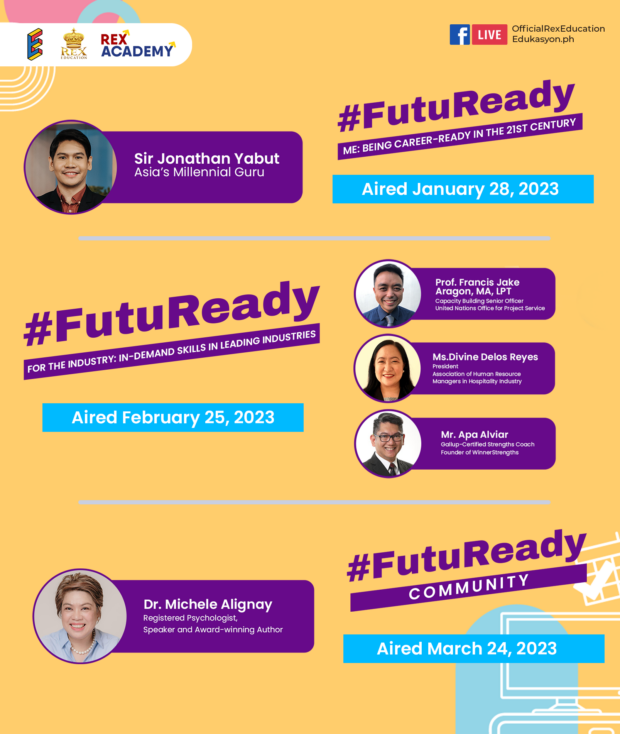Rex Education leads #FutuReady career conversations
Building a solid career is not an easy process; it requires investment in time, effort, and resources. If getting a degree is already challenging, securing a career with a great development path in the future could be even more challenging. There’s no shortcut or secret formula; it’s a lifelong learning journey that may be full of competition and situations beyond one’s control. In this ever-changing world, having in-depth conversations about career resilience and future readiness is crucial and relevant. What does it mean to be future-ready? And what does it take to have a future-proof career?
Rex Education, through Rex Academy and in collaboration with Edukasyon.ph, launched a three-part webinar titled “#FutuReady: Preppin’ Yourself to Face a New World.” This webinar series aimed to help students and fresh graduates who are gearing up to enter the professional world, starting their careers, and contributing to society. The series featured experienced professionals who discussed relevant topics about career and future readiness and industry know-how. It was divided into three webinars, beginning with #FutuReady Me, followed by #FutuReady for the Industry, and finally, the #FutuReady Community.
The Anatomy of a #FutuReady Learner
The first installment of the series, #FutuReady Me, delves deeper into the anatomy of a future-ready learner. It focuses on understanding graduate attributes and being career-ready in the 21st century. According to this webinar’s speaker, Mr. Jonathan Yabut, an outstanding marketer, a motivational speaker, and an author, there are three crucial skills that every learner should possess: communication skills, leadership, and critical thinking. A future-ready learner should be able to communicate effectively, take the initiative, and think outside the box. Self-learning, being proactive, and constant practice are necessary to develop these skills.
Mr. Yabut also emphasized that to have a future-proof career, we must constantly strive to improve ourselves, hold ourselves to the highest standards, and seek the best practices. Preparing for the future is more than just getting a degree and finding a job; it is a lifelong learning journey because everything we learn is another building block for the future.
Enhancing Skills to be #FutuReady for the Industry
For the second part of the series, three accomplished professionals from the educational, business, and hospitality sectors explained how to be #FutuReady for the industry and what specific skills are in high demand for a successful career.
Ms. Divine Delos Reyes, a human resources expert, believes we must learn to decide on a career path as early as possible to be future-ready. We can identify our ideal career by self-assessing our skills and interests, looking for influence and inspiration, and building confidence and passion. Mr. Francis Jacob Aragon, a professional trainer and educator, also underlined the importance of pursuing hobbies because they can be the foundation of a career.
However, many struggle to figure out what they genuinely want to do or what path to take after college. Mr. Apa Alviar, a certified strengths coach, reminds everyone not to feel pressured to stick to a particular industry. Whenever we feel dissatisfied with our current job, explore how we can make a difference and take it as a learning opportunity for personal and professional growth. Building a career could be a roller-coaster ride, so it’s important to learn to recover from mistakes and failures. To be future-ready for the industry, we must anticipate challenges and changes.
Achieving a #FutuReady Community
As we move forward from being a future-ready learner to future-ready for the industry, let us also take a step to be #FutuReady as a whole community. Being future- and career-ready goes beyond personal gains; it should also translate into benefits for the society. Dr. Michele Alignay, a registered psychologist and award-winning author, highlighted the importance of human skills to impact the community positively. Human skills are nontechnical skills; they are our abilities to manage ourselves and interact and relate to one another. Specifically, these are the skills that encompass our well-being and mental health:
- Critical thinking or having the mental capacity to think at onr feet or solve problems independently.
- Coping and resilience or being psychologically ready to face difficulties and navigate adversities.
- Collaboration, working with others, leading by example, or being a team player.
- Compassion and empathy, showing we genuinely care for others and that we practice self-kindness.
The #FutuReady series is more than just an initiative; it’s part of advocacy to promote building a brighter future for every individual, industry, and community. As Edukampyons and for fellow Edukampyons, REX will continue to collaborate with like-minded organizations to deliver programs that will help every learner unleash their potential, become the best versions of themselves, and reap long-term success in the future.
ADVT.
